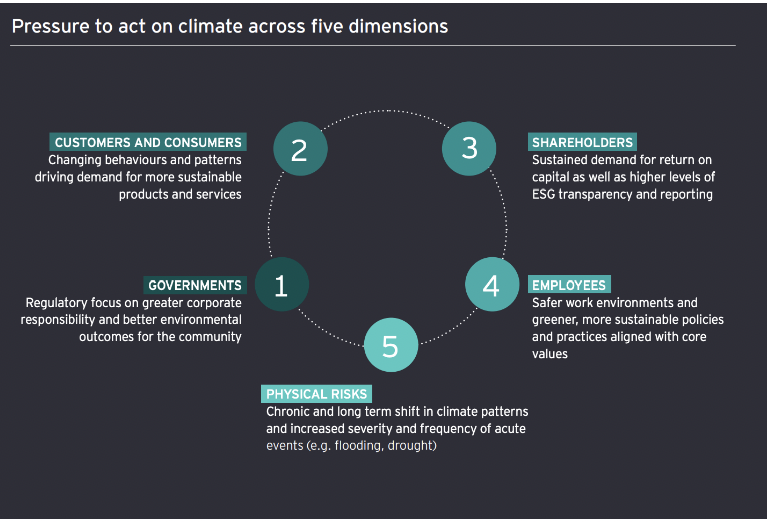Key Takeaways
- As consensus builds that climate change is real and consequential, and must be addressed, businesses that choose not to respond are increasingly likely to have action forced upon them by government, investors, and other stakeholders- Ernst & Young report
- The World Economic Forum notes a significant increase in executives' understanding of the business case for sustainability, emphasising that a substantial proportion of companies plan to increase their sustainability investments in 2024. - World Economic Forum
- Tightening national emissions budgets will drive governments to impose more stringent regulatory requirements on organisations over time, particularly in advanced countries. —Ernest & Young Report
Why are companies making net zero commitments?
Despite the increasing risk of climate change, businesses still need to earn profits and answer to shareholders, so for leadership, there must be value in committing to net zero. The sheer number of the world's largest and leading companies who have made this commitment is proof in itself, but it's important to deeply understand the drivers or forces that are pushing companies to net zero with such speed and scale. These forces are not just external pressures like legislation, but also opportunities that forward-thinking companies are taking advantage of to innovate, adapt, and get ahead of the competition.
“These pressures are increasing as the accumulation of real-world events highlights the consequences of climate change. These factors also influence the context in which governments make decisions.”— Ernst & Young report

Force 1: Governments
Regulatory bodies are increasingly focusing on corporate environmental responsibility, mandating companies to adopt practices that positively impact the community. This includes the implementation of environmental laws, incentives for green initiatives, and penalties for non-compliance, pushing companies towards sustainable practices.
The European Climate Law, which was passed in June 2021, turns the political commitment of net zero emissions by 2050 set by the European Green Deal into a legally binding obligation for associated countries. It has an intermediate target of reducing net greenhouse gas emissions (emissions after deducting removals) by at least 55% by 2030, compared to 1990 levels.
Force 2: Customers and consumers
Consumer behaviour is shifting towards a preference for eco-friendly products and services. Customers are making more informed choices and are often willing to pay a premium for sustainable options, driving companies to innovate and adapt their offerings to meet this growing demand.
A McKinsey report highlights that the EU's Green Deal and Circular Economy Action Plan are exerting pressure on companies to meet more stringent regulatory requirements and consumer demands for sustainable products and services.
Force 3: Shareholders
Investors are looking for sustainable investments that promise long-term returns. They expect transparency in environmental, social, and governance (ESG) matters, which includes clear reporting on sustainability efforts and outcomes. This demand is leading companies to incorporate ESG factors into their business models and reporting.
Force 4: Employees
A growing number of employees seek to work for companies that prioritise sustainability, aligning their operations with broader environmental values. Companies that offer safer, greener work environments and adopt sustainable policies are more likely to attract and retain talent.
Force 5: Physical risks
Climate change is leading to more severe and frequent natural disasters, such as floods and droughts, which can disrupt business operations and supply chains. Companies are recognising the need to mitigate these physical risks by implementing strategies to adapt to and mitigate the effects of climate change.
Activity: Think about these forces and how they are currently impacting your company- do any of them resonate strongly with you?
.svg)